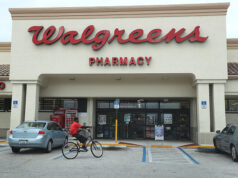The total value of deals by pharmaceutical and life sciences companies fell sharply in the third quarter of this year after two consecutive quarters of total values exceeding $100 billion, according to a report released Thursday. But that was expected, given a pause in large deals.
Deal value for the third quarter was $42 billion, a steep drop from a value of $147.3 billion in the first quarter and $125.6 billion in the second quarter, according to the report, by London-based professional services company PwC. The quarter saw 70 deals, the second highest level in the last two years.
Several trends observed in the third quarter will likely continue into the fourth quarter and 2020, according to the report, as drug and device companies spend large amounts of money despite concerns related to geopolitical risks and global economic growth.
However, one reason the second quarter deal value was so high was because of Chicago-based AbbVie’s acquisition of Allergan in June, for $63 billion, marking one of the biggest deals of the whole year. Excluding that deal, the value for the third quarter was actually higher than that of the previous quarter, according to the report.
The largest deal in the third quarter was $13 billion and there were two megadeals. In August, Celgene sold rights to the psoriasis drug Otezla (apremilast) to Amgen for $13.4 billion in order to satisfy antitrust concerns ahead of its acquisition for $74 billion by Bristol-Myers Squibb, announced in January and contributing to the large dollar volume of deals in the first quarter. Otezla, which is one of Celgene’s top-selling drugs, raking in revenues of $1.6 billion last year, was seen as competitive with BMS’ investigational TYK2 inhibitor, BMS-986165.
Despite the large number and dollar value of mergers and acquisitions, drugmakers are looking for ways to drive shareholder value by means other than M&A, the report found. One example it cited was the deal announced in July, whereby Mylan announced a decision to form a new company with Upjohn, the division of Pfizer that is focused on off-patent branded and generic drugs, calling the combined firm NewCo, pending the adoption of an official name. The new company’s market will be primarily in North America and Europe, together accounting for 55 percent of revenues, while Asia Pacific will be the second largest, accounting for 30 percent.
M&A will nevertheless remain an attractive option for companies, despite short-term concerns like the U.S. presidential election in 2020 and the status of the U.K.’s withdrawal from the European Union, the report found.
Photo: Feodora Chiosea, Getty Images







